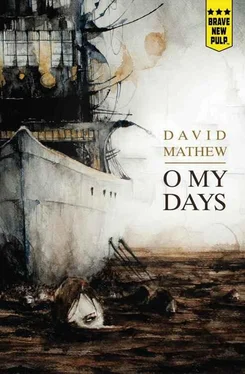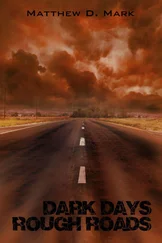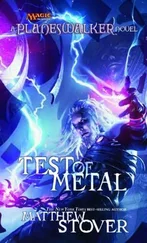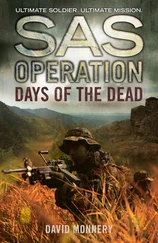We don’t need to do what? he asks me, eyeballing the shank in my right hand. Stay where you are, he continues nervously.
Let them go, I demand.
You know I can’t do that, says Ayaan.
We’ll take our chances.
In the oil? Impossible! No one survives the oil.
How many have tried?
A good many. Now enjoy the remainder of your rest period. When it’s your turn to row, I assure you you’ll have an easy shift.
I don’t believe you. My back is stinging, where I was flogged yesterday.
Not by me!
It doesn’t matter who by.
Will you stand aside?
No.
Ayaan removes from a loop on his belt the whip that is coiled there like wire. The whip is only three-quarters unfurled when Ayaan flips the weapon with a wristy motion: the business end of the whip strikes out; there’s a warning crack of air about a palm’s width from my left eye. I’m aware of how accurate Ayaan can be with his weapon of choice; he’s a marksman with it. The shot, I know, is merely to frighten me back into submission—and it nearly works. The thin rope is on the floor after the assailment. Taking the force of what needs to be done as my spur, I stamp my bare foot down on to the whip—he tries to pull it back—and I attempt to pace along it like a tightrope walker, climbing up the weapon as I stride closer. The sharp end of the wooden blade—I dash it into Ayaan’s left upper arm. He whimpers with the discomfort, the pain lending him strength in his other arm. Pulling harder on the whip, he burns through some of the skin on my feet; I am knocked off balance as he retrieves the whip I’m standing on. A fight begins. Dissimilar to a fight at Dellacotte, there is no noise from the onlookers. Sure enough the rowing stops—that pointless, pointless exercise—which will shortly be noticed, but not one of the prisoners breathes a word of encouragement. They watch as Ayaan and I grip and wrestle, punch and bite. He is the stronger, no doubt about that, and I understand that my knife to the arm is no deterrent. Though I don’t wish to hurt Ayaan (as far as I know, he has done nothing wrong to me other than follow orders) a stark reminder of whose dream this is is required. I pluck my shank from his bicep. As we struggle on, it is like being in a waxwork museum: not only does no one speak, no one moves either. Though I don’t pay much attention to those around me, what I do see when I get a fraction of a second to glance—what I see are dead eyes, lifeless eyes. And two sudden movements. Ayaan and I are wriggling on the wooden floor; splinters bite at my exposed, rough and raw skin. I notice a woman with dark hair—a woman in her early sixties—make the sign of the cross on her chest. The second movement is Dott standing up. Ayaan is striving to prevent me from stabbing him again. And while I don’t want to have to stab him again, I can’t see a valid alternative. He has a job to do. His job is bringing his problems upon himself. I can’t tell him this. My sharpened piece of wood is aimed for his shoulder. It is my opponent’s deflective blow that knocks the point elsewhere: the wood slides effortlessly into the left side of his neck. Ayaan’s eyes are wide with horror. I hope what my eyes say is apology enough. As blood starts, first to trickle, leak, then to spurt, I roll away from his writhing body. When he starts to scream I understand that Noor and I will have to move faster than ever.
You’re all free! I shout.
Not only a gross exaggeration, but an oversimplification to boot. We remain on a ship in the middle of a vast body of polluted water. There is no way back to shore, other than to swim; and once ashore? There is no home remaining for prisoners, however close to the ends of their sentences some of them might be. I try to read the mood of the gathered slaves. Attempting to rile them to mutiny, it seems, has been as effective as nailing the oil to a wall. If anything, what fills the eyes in those few not stunned to inertia by months and years of pointless physical abuse, is resentment. I have torn the status quo.
Come on! I say to Noor. You can be free!
We ascend the wooden steps, but Ayaan’s screams—possibly even the unexpected stench of his blood, as if the wound I hope won’t be fatal has unleashed the rotting insects of his soul—have alerted his muchachos. Three more men, similarly hairy as this particular watch’s driver, arrive near the crest of the stairs. One of them—the youngest, I would guess—is carrying a strap: a snub-nosed automatic pistol that seems out of place, but I’m confident will be no less convincing for it.
I shout to Noor: Run!
Not one heroic bone in his body does Dott contain, it seems, for he doesn’t wait for me to offer the chance of escape a second time. Bewilderingly light on his feet, he makes a sprint for the stern. The three jailers set to: on me. Nobody has taken the chance to overcome the powers that be. For all the lack of noise from below deck, I might be travelling on a ghost ship’s maiden voyage. Trying to keep hold of my wooden shank, I lash out, fearing a bullet might pierce my skin and a major organ. I fight with relish, but the hullabaloo is concluded, almost before it begins. No show of concern is shown for Ayaan, bleeding away his life, downstairs. Nor does any one of the three go in pursuit of Noor, smugly comfortable in the notion that he has no place to run to. Though I’ve managed to scrape and poke with my shank, I am forced at gunpoint to relinquish my hold on it now. Weapon-free, I am now taught the error of my ways. The beating, still at gunpoint, is savage and enthusiastic. I have heard no splash; no sound of Noor’s entry into the water. What can he be doing, the ingrate? I am taking this beating in order to liberate him, and he doesn’t have the common decency to flee when he has the chance! Will they beat me and then put a bullet in my head?
They are certainly making sport of the first half of the retribution for my actions. I am rolled up into a ball, the kicks landing thick and fast. The blood in which I wriggled—Ayaan’s blood—I smear on the deck, smudging it around like paint. Finally I hear the splash of a body striking water: Noor has jumped for it. Between blows to my system I have a crack at informing my attackers I’ve given up. Gladly I will take Noor’s place on the chain-gang, working his shift after my own. Little by little the assault wanes. I try to imagine him swimming. Oily as a seabird, his arms already weakened from rowing, pumping hard and painfully through the muck.
I am left alone to examine my injuries—or for them to examine me—leaning against a mast that feels cool to my forehead’s touch. For the moment I can’t remember Noor’s voice; it’s an effort to remember his face. But what is clear enough, moments later, is the manner in which the prisoner spent his last moments on the ship. The follow-up kicking is as equally severe. I am told it will happen after dinner, so that’s a nice dessert to look forward to. Not that I receive any dinner. The upper echelon of the ship’s hierarchy dines and rests. When the meals have gone down and the food has been digested, it is time for me to have my chain unlocked so I can cease hugging the mast. And the reason for this second onslaught? On his way to freedom, before he crash-landed into the oasis, he stole more water. He stole a bottle from Ayaan’s own supply. In a surrogate fashion, I received the brunt of the jailers’ bad tidings.
Dott tells me I helped him escape, and I did. What he omits is the part where I nearly lose my eyesight to do so. Where my testicles are cramped by kicks, pushed up into my torso; where my scrotum is scratched open. But after half an hour, the viciousness desists; the attackers have grown bored. Again, I am chained to the mast, there to stay—whatever the weather; weather come what may—for the next seventy-two hours.
Читать дальше












